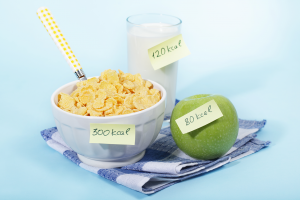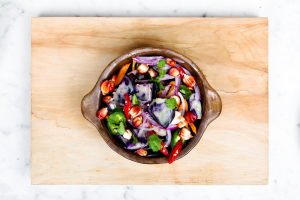Most of us have been raised on the idea that counting calories is the most effective way to lose weight. If you eat more calories than you expend, you will gain weight and vice versa – this is known as the calories in, calories out hypothesis.
Thankfully there’s a lot more to it than that, and experts now understand that the body uses and handles calories from a range of food sources very differently. Also, we now know that restricting calories can be damaging to the body and may work against weight loss in the long term.
So what is a calorie?
A calorie is one unit of energy, or more precisely, one calorie represents the amount of energy needed to raise one kilogram of water by one degree centigrade. The calories that come into your body from food must be either used for something such as fueling movement, keeping your heart pumping or maintaining your body temperature, and any excess above and beyond what your body needs is stored as fat.
Restricting calories can be damaging to the body and may work against weight loss in the long term
How do calories work?
Human nutrition is so individual and complicated that the theory of counting calories is just far to simplistic to be effective for everyone. That’s not to say that calories don’t count at all, and in some cases counting calories can be a useful way to make sure you’re getting enough, for example athletes who need to take in a specific amount of calories for their performance needs. But for the rest of us, what your body does with the calories you eat counts much more.
The idea that ‘calories in’ simply represents the food we eat and ‘calories out’ only factors in the exercise we do misses many other elements that play a role in the complex way that calories are handled by the body. For example…
| ‘Calories in’ or what we get from our food can be influenced by… |
|---|
| What we eat – the amount of energy needed to break down different types of food varies significantly. For example, it takes more energy to break down protein than carbohydrates, so fewer calories are available to us after eating protein. Also, healthy foods high in calories, such as avocados, are not processed and stored in the same way as an unhealthy food containing the same calories, like a chocolate bar. Plus they have very different effects on your energy, appetite and long-term health. |
| Our digestion – how many calories we actually get from our food is dependent on the amount we can absorb. This will be variable depending on our stomach acid levels, enzyme production, and gut flora. |
| Our ability to calorie count – it’s estimated that most people underestimate their calorie intake by between 10 and 45%. |
| ‘Calories out’ or what we do with the calories we consume can be influenced by… |
|---|
| Our body composition – how much muscle mass we have compared to fatty tissue will impact on the amount of calories we need and use, with muscle using more than fat. |
| How warm we are – our body temperature will influence calories used, with higher temperatures burning more calories. |
| How tall we are – taller individuals need and use more calories. |
| Non-exercise movement – those that fidget more use more calories. |
| Female hormones – during the week or so before a menstrual period, more calories are burned and faster than at other times during the month. And post-menopausal women can expect a slow-down in the rate that they burn calories. |
| Insulin – insulin’s job is to remove sugar from the bloodstream after we eat carbohydrates, and store it away in muscles, the liver and fat cells. To put it simply, the more insulin secreted, the more fat we store. It stands to reason that eating more calories from carbohydrates will increase insulin secretion and encourage fat storage. |
Calorie counting for weight loss
There’s no doubt that counting calories can help you to lose weight – science dictates this, and millions of people have found it to be true. And there’s a hugely profitable industry selling diet foods and drinks that capitalise on this. The trouble is that while we all respond differently to fluctuations in calorie intake, on the whole counting calories doesn’t tend to work or be sustainable in the long run for several reasons.
Firstly, restricting calories often leads to hunger, partly because of not eating enough, but also due to the perception of eating less calories – research has found increased feelings of hunger in individuals told they were having a low calorie meal regardless of the actual calorie content.
Additionally, when in a calorie deficit, the body tends to switch to starvation mode, meaning it will slow the metabolism to compensate. This includes shedding muscle because it burns more energy than fat, and even conserving fat to provide a source of energy should you need it at a later stage. This impacts negatively on body composition, and also encourages weight gain as soon as you start to increase calories and eat normally again, because your new, slower metabolism will burn less calories than before.
Why you shouldn’t calorie count

What we eat is more important than the calories, depending on your lifestyle. A balanced diet based on your activity is key.
Calorie counting skews our views on what is healthy, leading us to equate low calorie food with being healthy and high calorie food with being unhealthy. This robs many people of their enjoyment of food and leaves them wary of eating really healthy, nutritious foods higher in calories, such as avocados, nuts and seeds, and coconuts.
We have become fat phobic as a result of low calorie thinking, and restricting such healthy fats is harmful because our bodies rely on fat for nutrient absorption, healthy skin, hormone balance, brain function, and the health of all our cells. Fat also helps us to feel fuller for longer, which can prevent overeating – in fact there is plenty research showing that lower carbohydrate and higher fat diets are more effective at promoting weight loss than low calorie diets. Calorie counting also encourages us to eat too much sugar, sweeteners and carbohydrates, which can lead to sugar cravings and weight gain especially around the middle, not to mention a whole host of health problems.
When in a calorie deficit, the body tends to switch to starvation mode, meaning it will slow the metabolism to compensate, including shedding muscle
Counting calories is also problematic for psychological reasons too. It doesn’t address the emotional triggers that cause people to overeat in the first place, meaning that calorie counting without looking deeper can encourage long term yoyo dieting. Calorie counting can promote an obsession with controlling food intake, and research has even found calorie counting to increase stress. It can also create an unhealthy relationship with exercise, with some calorie counters becoming compulsive about exercise in order to burn off calories eaten.
What you should do instead

It’s really simple – food should be a pleasure and shouldn’t involve counting calories, points or feelings of guilt.
A better, more sustainable and health-promoting approach is to eat real, unprocessed food that contains the nutrients, fat, protein, fibre and slow-release carbohydrates needed to fuel all of your body’s many biochemical processes to keep you healthy.
It’s really simple – food should be a pleasure and shouldn’t involve counting calories, points or feelings of guilt. Just fill half of your plate with colourful veggies and salads, always eat some quality protein with your meals including breakfast, and don’t be afraid to include natural fats from olive oil, coconut oil, avocados, nuts, seeds or butter. Focus on health, not calories, address emotional reasons behind overeating, think about your individual needs and experiment to find a way of eating that gives your body what it really needs without feeling hungry, stressed and worried.




